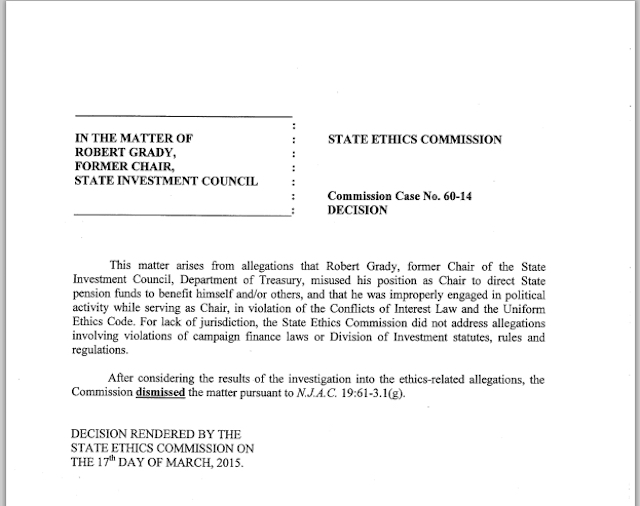New Jersey’s State Ethics Commission has dismissed a union’s ethics complaint against former pension chair Bob Grady, CIO has learned.
Last September, the president of America’s largest union, the AFL-CIO, sent an 11-page letter to the commission accusing the fund of investing in assets that would personally enrich its chair, and calling for an investigation into the fund’s allocation practices. Grady, the complaint alleged, misused his position as chair and was improperly involved with New Jersey Governor Chris Christie’s political operations.
“From the beginning, the complaint was entirely bogus, frivolous, and partisan. This is everything that is wrong with American politics.” —Grady
“After considering the resulting of the investigation into the ethics-related allegations, the commission dismissed the matter,” the March 17 decision stated.
Reached by CIO, Grady saidhe is “not at all surprised” by the commission’s decision to strike down the allegations. “From the beginning, the complaint was entirely bogus, frivolous, and partisan. This is everything that is wrong with American politics,” he continued. “Despite the fund having achieved $35 billion in gains in four years, the mindless partisans who run these unions make up completely phony claims like this instead of worrying about beneficiaries.”
The State Ethics Commission did not address the union’s allegations of campaign finance law violations, citing lack of jurisdiction.
The complaint stated that “the Division of Investment in the New Jersey Treasury Department under the governance and direction of the State Investment Council, and Chair Grady, has chosen to invest pension funds into hedge funds and private equity firms after their principals have made political contributions that benefit the Governor”—Chris Christie—“and the Republican Party.”
Grady stepped down as chairman last November after nearly five years at the helm of the $80 billion pension fund’s board. He had stayed on longer than the agreed four years to ensure a smooth transition between CIOs, Grady said at the time. According to several inside sources, his son was also seriously ill, motivating the Carlyle alum to curtail his travel schedule.
Last month, Grady rejoined the direct private equity sphere, accepting a partner position with San Francisco-based Gryphon Investors.
 Source: New Jersey State Ethics Commission
Source: New Jersey State Ethics Commission
Related Content: Anatomy of a Questionable Scandal: NJ Pension Accused of Pay-to-Play & Bob Grady Joins PE Firm Gryphon Investors
